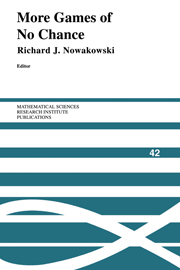Book contents
- Frontmatter
- Contents
- Preface
- The Big Picture
- Idempotents Among Partisan Games
- On the Lattice Structure of Finite Games
- More Infinite Games
- Alpha-Beta Pruning Under Partial Orders
- The Abstract Structure of the Group of Games
- The Old Classics
- Higher Nimbers in Pawn Endgames on Large Chessboards
- Restoring Fairness to Dukego
- Go Thermography: The 4/21/98 Jiang-Rui Endgame
- An Application of Mathematical Game Theory to Go Endgames: Some Width-Two-Entrance Rooms With and Without Kos
- Go Endgames Are PSPACE-Hard
- Global Threats in Combinatorial Games: A Computation Model with Applications to Chess Endgames
- The Game of Hex: The Hierarchical Approach
- Hypercube Tic-Tac-Toe
- Transfinite Chomp
- A Memory Efficient Retrograde Algorithm and Its Application to Chinese Chess Endgames
- The New Classics
- The 4G4G4G4G4 Problems and Solutions
- Experiments in Computer Amazons
- Exhaustive Search in Amazons
- Two-Player Games on Cellular Automata
- Who Wins Domineering on Rectangular Boards?
- Forcing Your Opponent to Stay in Control of a Loony Dot-and-Boxes Endgame
- 1 x n Konane: A Summary of Results
- 1-Dimensional Peg Solitaire, and Duotaire
- Phutball Endgames Are Hard
- One-Dimensional Phutball
- A Symmetric Strategy in Graph Avoidance Games
- A Simple FSM-Based Proof of the Additive Periodicity of the Sprague-Grundy Function of Wythoff's Game
- Puzzles and Life
- The Complexity of Clickomania
- Coin-Moving Puzzles
- Searching for Spaceships
- Surveys
- Unsolved Problems in Combinatorial Game Theory: Updated
- Combinatorial Games: Selected Bibliography With A Succinct Gourmet Introduction
More Infinite Games
Published online by Cambridge University Press: 29 May 2025
- Frontmatter
- Contents
- Preface
- The Big Picture
- Idempotents Among Partisan Games
- On the Lattice Structure of Finite Games
- More Infinite Games
- Alpha-Beta Pruning Under Partial Orders
- The Abstract Structure of the Group of Games
- The Old Classics
- Higher Nimbers in Pawn Endgames on Large Chessboards
- Restoring Fairness to Dukego
- Go Thermography: The 4/21/98 Jiang-Rui Endgame
- An Application of Mathematical Game Theory to Go Endgames: Some Width-Two-Entrance Rooms With and Without Kos
- Go Endgames Are PSPACE-Hard
- Global Threats in Combinatorial Games: A Computation Model with Applications to Chess Endgames
- The Game of Hex: The Hierarchical Approach
- Hypercube Tic-Tac-Toe
- Transfinite Chomp
- A Memory Efficient Retrograde Algorithm and Its Application to Chinese Chess Endgames
- The New Classics
- The 4G4G4G4G4 Problems and Solutions
- Experiments in Computer Amazons
- Exhaustive Search in Amazons
- Two-Player Games on Cellular Automata
- Who Wins Domineering on Rectangular Boards?
- Forcing Your Opponent to Stay in Control of a Loony Dot-and-Boxes Endgame
- 1 x n Konane: A Summary of Results
- 1-Dimensional Peg Solitaire, and Duotaire
- Phutball Endgames Are Hard
- One-Dimensional Phutball
- A Symmetric Strategy in Graph Avoidance Games
- A Simple FSM-Based Proof of the Additive Periodicity of the Sprague-Grundy Function of Wythoff's Game
- Puzzles and Life
- The Complexity of Clickomania
- Coin-Moving Puzzles
- Searching for Spaceships
- Surveys
- Unsolved Problems in Combinatorial Game Theory: Updated
- Combinatorial Games: Selected Bibliography With A Succinct Gourmet Introduction
Summary
ABSTRACT. Infinity in games introduces some weird and wonderful concepts. I examine a few here.
My PhD thesis was on transfinite numbers and ordered types and when I got my first job in Cambridge it was as a resident mathematical logician. This was very fortunate for me since I am also interested in wasting time, professionally, and I have invented some very powerful ways of wasting time. One of these is combinatorial game theory. Most combinatorial game theorists automatically have a finite mind set when they look at games — a game is a finite set of positions. However, as a logician, developing surreal numbers, this was irrelevant. I just took whatever was needed to make the theory work. For additive games the notion of sum worked very well. One does not need finiteness just, essentially, the idea that you cannot make an infinite sequence of legal moves.
One of the main results, the existence of strategies for games with no infinite chain of moves, has two proofs one of which works well for finite games the other for all games. The first involves drawing the game tree and, starting from the leaves, marking a position with a P, for Previous, if the next player to play from this position cannot win and otherwise mark it with an N, for a Next player win. The other proof is a reductio ad absurdum. Suppose we have a game with no strategies. Prom this position look at the options: some will have strategies and some maybe not. If one option is marked with a P then we can move there and win so the original position is marked with an N. If all options are marked N then we can mark it as P. If there is no strategy then one of the options has no strategy and we iterate the argument and we get an infinite chain of moves which we supposing there wasn't. However, one of the interesting things about this argument is that a game can be perfectly well defined and computable but its winning strategy not be computable. The mathematical logician Michael Rabin studied this situation and found some interesting results.
Information
- Type
- Chapter
- Information
- More Games of No Chance , pp. 31 - 36Publisher: Cambridge University PressPrint publication year: 2002
